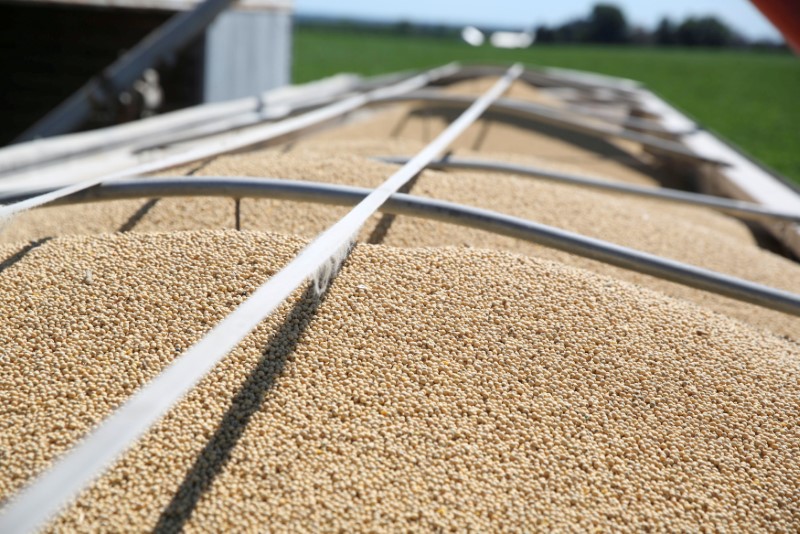By Julie Ingwersen and Karl Plume
CHICAGO (Reuters) - China's meager first purchase of U.S. soybeans since its trade war with the United States began in July disappointed farmers, grain traders and a U.S. government official hoping for larger sales to lift slumping prices and absorb a huge surplus across the U.S. farm belt, they said on Thursday.
The U.S. Department of Agriculture (USDA) announced private sales of 1.13 million tonnes of U.S. soybeans to China, confirming sales Reuters reported a day earlier.
But additional buying by the world's top soybean importer has yet to materialize, traders said, even after U.S. President Donald Trump told Reuters in an interview on Tuesday that China is buying a "tremendous amount" of U.S. soybeans.
"Having a million, million-and-a-half tonnes is great, it's wonderful, it's a great step," USDA Deputy Secretary Steve Censky said at an Iowa Soybean Association annual meeting on Thursday. "But there needs to be a lot more as well, especially if you consider it in a normal, typical year, we'll be selling 30 to 35 million metric tonnes to China."
Soybean prices fell as grain traders had hoped for more deals, eyeing a massive U.S. soybean surplus in storage and what is expected to be a record-large harvest from the world's biggest soybean exporter Brazil just weeks away.
The sales came after Trump and China's President Xi Jinping agreed to a 90-day detente in their tit-for-tat tariff war to negotiate a trade deal after meeting at the Group of 20 summit in Buenos Aires.
The purchases, which traders said were made by state-owned companies in China, were viewed as the most concrete evidence yet that Beijing is making good on pledges the U.S. government said Xi made when the two leaders met on Dec. 1 and agreed to a 90-day detente to negotiate a trade deal.
While it was the ninth largest single-day U.S. soybean sale on record, it amounted to just 3.5 percent of China's U.S. soy purchases last year and 2 percent of U.S. shipments to all foreign buyers.
"If further activity and amounts aren't confirmed, the trade could soon be ready to settle in for a long, cold, fundamentally bearish winter," said Matt Zeller, market intelligence analyst with INTL FCStone.
TRADE AID DELAYED
The actively traded Chicago Board of Trade March soybean contract
The 25 percent tariff Beijing imposed on U.S. soy shipments in July in retaliation for American duties on Chinese goods remains in place.
China last year bought about 60 percent of U.S. soybean exports in deals valued at more than $12 billion. The purchases confirmed on Thursday were less than $500 million.
"There was talk we'd see like 5 million tonnes over the next few days, so we will need some follow-through buying from China, especially outside of Sino," one U.S. trader said, referring to China's state-run buyer Sinograin.
U.S. exports to China dropped to 8.2 million tonnes in the first 10 months of the year, with the vast majority of that shipped before the tariffs took effect in July. That was down from 21.4 million in the same 10-month period last year, according to government figures.
With exports to China drying up, U.S. soybean prices have traded around their lowest levels in a decade in recent months.
The White House this week delayed additional payments from a promised $12 billion aid package for farmers stung by the trade war because it expected Beijing to resume buying U.S. soybeans.
The U.S. Soybean Association said in a Thursday statement the sale announcement would not fix the "prolonged period of low prices soybean farmers have faced since the trade war began."

Davie Stephens, the association's president and a Kentucky grower, said "it is critically important that we see additional purchases and actual deliveries, and for USDA to make a payment on the second half of 2018 soybean production."